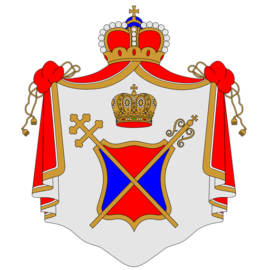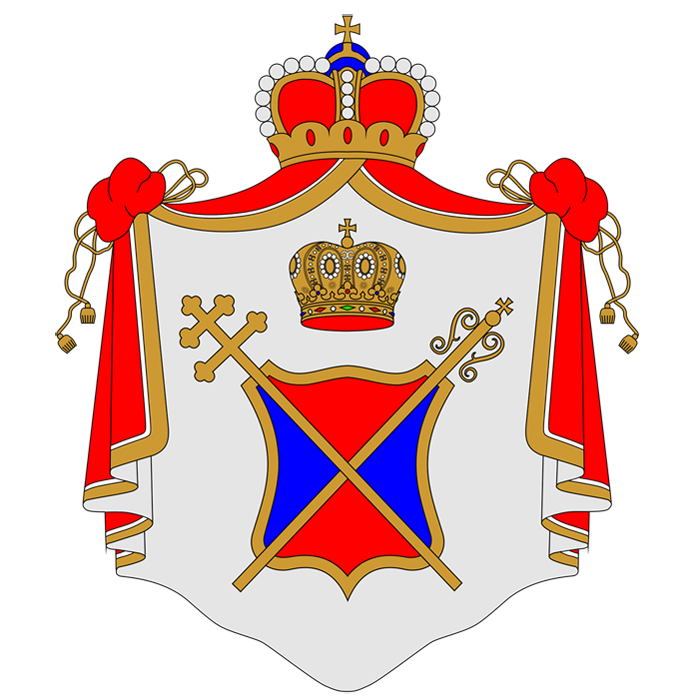There is no hatred towards anyone in the Montenegrin Orthodox Church
(Interview for CdM)
CdM: For Christmas Day, the media missed one very interesting fact, and that is the paradigm of our divisions. Two rituals, one in front of the monastery, and the other in front of the court, were led by two Bojovićs. Is it true that you and Bishop Kirilo of the Serbian Orthodox Church are close relatives?
Bishop Boris: Since your question implies that you know enough about fraternal ties, I will explain with some discomfort the family relations with the representatives of a foreign church working in Montenegro. Sometimes we do not have the right to strict privacy and we are obliged to give clarifications. Maybe it is God’s providence or a way to understand the extent to which the Orthodox population in Montenegro is divided. I intentionally say the population, because Kirilo (Cyril) – Milan Bojović and I are only hematologically (by blood) close.
His grandfather and my grandfather were born brothers, while Kirilo and I are members of two nations. We belong to Orthodox Christianity, but we do not cultivate similar civilizational values. We pray to God in two different languages and for two nations, we belong to two churches. Kirilo accepted to “mutate” into some form of Serbo-Montenegrin, which is no to wonder, because I think that most people like him have found a “real” reasons to change their affiliation – it probably pays off.
I would like to remind you of an interview I gave in 2008, when these “mutated” blood relatives renounced their ancestors and me as personifications of our common Montenegrin origin, when I wrote to forgive my relatives because they “had to do it”, and now we see why: Kirilo became the bishop of the Serbian Orthodox Church, one of his brothers, Dragan, became a member of the Parliament of Montenegro; Dragan’s wife Jelena Borovinić became the Minister of Health, and Kirilo’s and Dragan’s brother Radovan became the Secretary of the Ministry of Ecology, Spatial Planning and Urbanism!
Now, someone should convince us that they would have been in those places if their son-in-law Predrag Bulatović had not opened the door to Amfilohije (late Serbian orthodox church Metropolitan) (he married their uncle’s sister). After that, little by little, they entered all forms of government – spiritual, legislative and executive! Never denying their education and professional expertise, you can still see that it pays to “mutate” for some – you get everything and you lose yourself!
CdM: Redemption of Bojovic in MOC?
Bishop Boris: My need for a spiritual life took me to church at an early age. I was born as a Montenegrin and I did not accept to change the identity I acquired by birth. I singed for a year in the choir of the Serbian Orthodox Church in Podgorica, and in 1998 and I decided to study to be a priest, and then, at the age of less than 17, I finally went to the Montenegrin Orthodox Church (MOC). There is no doubt: I am in the Montenegrin Orthodox Church because of my faith, because I am a Montenegrin and because it is our only, primordial church.
CdM: What is the cure for our divisions?
Bishop Boris: Whoever would find that “cure” for us could likely win the Nobel Peace Prize. I think that the path to overcoming our divisions is civil society turned to European values and entering in the EU as soon as possible. And another very important thing. In order to avoid conflicts, the efforts to Serbize the Montenegrins (assimilation of Montenegrins), undertaken by the new Government of Montenegro and the Serbian church, should stop. They must finally understand how important this is for Montenegrins, and by convincing us that we should get used to this “new” Montenegro, while we are not being able to access our churches and monasteries to pray to God, they risking a lot. There has never been more tension in Montenegro.
CdM: Filip Adžić, MP of URA, and declared believer of MOC, said that the Montenegrin church was transformed into the church of DPS (Democratic Socialist Party), which distanced him from it. Mr. Adžić is a politician, but what would be you message to believers who may feel similar?
Bishop Boris: I can only quote: “Whoever feels the weight of his sins, then does not pay attention to the sins of his neighbor.” (Ava Moses)
CdM: They say that the MOC supports more atheists and members of other denominations than Orthodox Christians in Montenegro. Is the MOC a spiritual need of Montenegro or a political project of the Montenegrin state?
Bishop Boris: There is a great absurdity in these statements that the church is supported by “atheists”. The MOC is a core spiritual need of Orthodox Montenegrins, which was renewed in 1993, but also the need of the state of Montenegro, to organize its Montenegrin church within its borders. The church is Christ’s, but it is divided into administrative units, so that every state that has a majority Orthodox population also has its own independent church.
CdM: The MOC is accused with flirting with right-wingers from the region, especially those in Croatia, and being a generator of hatred towards Serbs. Is that true, is there hatred in the Montenegrin church?
Bishop Boris: There is no hatred in the Montenegrin Orthodox Church towards anyone, and especially not towards the Serbian people and our brothers in Christ. The Church herself prescribes – she hates sin and not the sinner! The fact that we may sometimes talk about the sins committed by the Serbian Orthodox Church (SOC) towards us and point out how some alleged “believers” of the SOC treat Montenegro and the MOC is not and cannot be hatred. It is strange that someone is so affected by the truth, which every well-meaning person sees, that he declares it to be hatred.
Probably projecting their distorted view of the world onto others. May God help them! Just look at the comments on social networks, especially the portal of Russian-Serbian right-wing provenance, and you will see how much hatred there is against the MOC and everything related to Montenegro. We would not waste words on the statements of some officials.
CdM: The chapel on Lovćen is being aggressively promoted again. A compromise is required. Both the mausoleum and the chapel are the solution – say “moderate” voices in the Serbian Orthodox Church. What do you say?
Bishop Boris: There are no moderate voices on this issue, but they represent the destructive policy of everyone who promotes it. Everything is aimed at the violent Serbization (assimilation of Montenegrins) and annulment of Montenegro. The chapel they are talking about is not Njegoš’s, but the church was built as an imperial act of King Aleksandar Karađorđević over Montenegro (who annexed Montenegro). If they wanted the actual renovation of Njegoš’s chapel, which he dedicated to St. Peter of Cetinje, they would not have irrevocably demolish it after the war, since it was only damaged in the First World War. Nobody can return Karadjordjevic’s chapel to Lovćen!
CdM: Ethnophyletism is present on both sides among believers, tricolors on religious buildings drive believers away from the Metropolitanate of the Serbian Orthodox Church. On the other hand, many cannot accept the MOC as a church until it is canonically recognized by Constantinople. This makes people move away from Orthodoxy and Christianity. What is Orthodoxy for you, why is it your choice?
Bishop Boris: I will remind you that the Montenegrin Orthodox Church was forcibly abolished and drowned in a new church founded by the decree of King Aleksandar Karađorđević and established on the basis of the purchased tomos. About the position and structure of our church says Art. 40 of the Montenegrin Constitution of 1905: “The state religion in Montenegro is Eastern Orthodox. The Montenegrin church is autocephalous. It does not depend on any side of the Church, but it maintains unity in dogmas with the Eastern Orthodox Ecumenical Church. All other recognized religions are free in Montenegro. “
They present our love and care for Montenegro and our believers as ethnophyletism. This is again the distorted reality we mentioned. Throughout history, the Montenegrin Orthodox Church has had long periods when it did not communicate with the Patriarchate of Constantinople. This was at a time when the Patriarchate of Constantinople was cooperating closely with the Ottoman state, against which Montenegro had been fighting for centuries.
I think that people should be brought closer to Orthodoxy as it was in Montenegro, without kneeling, bowing, kissing the hands and lap of anyone as is it now. That Orthodoxy was expressed through the grace of God and love for one’s neighbor. Orthodoxy is not a choice, it is the faith of my ancestors! In Orthodoxy, man can know God’s presence and love and rise high as an intellectual and altruist.
CdM: One part of the society has a great resistance to the mantles, they consider the clergy a retrograde part of the society, extreme right-wingers. And no wonder after the 1990s. I recently saw your picture under the poster of Martin Luther King. We often forget that he was also a priest, and that Greek Orthodox priests were the heroes of the American Civil Rights Movement. Is there room for Montenegrin priests to be recognized as such in the future?
Bishop Boris: I really hope that God will give us more priests who will enlighten people and awaken in them faith and love for everything around us! Freedom and love are from God. Everything that has happened to us and is currently happening to the MOC and most of our clergy, encourages us to work even harder to enlighten and save everyone. We must never forget the good and humane people who are the ornament of the priestly vocation, although there are very few of them. The freedom of our ancestors and faith in the correctness of the path we have chosen gives us strength and hope. Everything that is retrograde and extreme has nothing to do with Orthodoxy. Especially not with Orthodoxy and the Montenegrin Orthodox Church, they are not related to the heretical variant that they want impose to us which is related to the deification of one man or the proclamation of war criminals and villains as saints.

